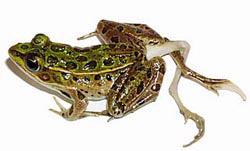Amphibian Declines Linked to Farm Run-Off

A study by University of Colorado researchers published last week in the journal Proceedings of the National Academy of Sciences shows a definitive link between fertilizer and pesticide run-off from farms and ranches and horrible deformities in frogs. While the findings were derived from experiments on a series of test ponds in Wisconsin, researchers are confident that similar processes are killing off frog populations around the world. A third of the world’s more than 6,000 amphibian species are considered threatened these days, and environmentalists hope that these latest findings will serve as a "smoking gun" in what up until now has been considered a species-loss mystery.
While scientists have attributed many amphibian problems to parasitic infections, the study documents how run-off from farms and ranches drives the process by fundamentally altering the ecosystems in the lakes and ponds where frogs live. As explained by Pieter Johnson, an ecologist and evolutionary biologist at the University of Colorado at Boulder who led the study, the chemicals in commonly used fertilizers and pesticides stimulate the growth of algae in waterways, which in turn increases the population of snails. Then microscopic parasitic worms called trematodes infect and kill the snails, using their dead bodies as breeding grounds. This glut of parasites swarms over tadpoles, the water-dwelling larvae of frogs, and burrow at the spots where limbs are developing, forming cysts and causing developmental deformities. In turn, birds and other predators eat the infected, often slow-moving, frogs, spreading the worms back into the ecosystem, perhaps miles away, through defecation.
"This is the first study to show that nutrient enrichment drives the abundance of these parasites, increasing levels of amphibian infection and subsequent malformations," said Johnson. "The research has implications for both worldwide amphibian declines and for a wide array of diseases potentially linked to nutrient pollution, including cholera, malaria, West Nile virus and diseases affecting coral reefs."
Sources: University of Colorado; Planet Ark

